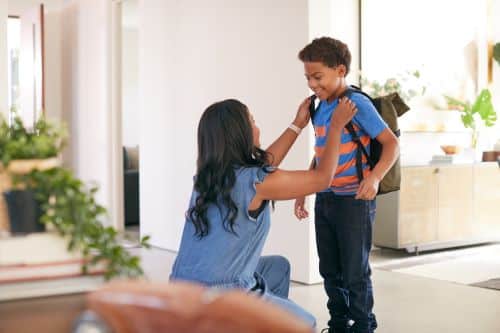As the school year gets underway—your children are reengaging with friends and classmates or are just starting in their first year of school—we thought it might be helpful to highlight seven key social skills for kids and provide recommendations on how you can teach and/or strengthen those skills within your child.
Learning social skills is an important element of a child’s development that can have an enormous impact on their well-being, their future, and the key relationships they develop as children, young adults, teens, and eventually adults out on their own.
According to the American Journal of Public Health, a child’s social and emotional skills in kindergarten could be a key predictor of success in adulthood. Because we know that whatever we learn first stays with us the longest, helping our kids learn a key set of social skills early in life will pay dividends for them as they grow and help them make friends easier, be better problem solvers, and create a bright future.
1. Listening

As we’ve said at Raising Families before, there’s a good reason we were given two ears to listen, two eyes to see, but only one mouth to speak with. Listening with our ears and eyes without talking and jumping to conclusions is one of the hardest things for most of us to do.
Daniel Kahneman’s book Thinking, Fast and Slow highlights the reality that, often, we are so confident in what we think and that all of our decisions are well considered that we don’t need to pause and really understand what we are hearing from others.
Yet, when we slow down and truly listen to understand, we might, in fact, come to a different conclusion and make a different decision.
All too often, we turn off our ears and engage our minds to create a rebuttal or retort about what someone is saying. Our children are no different. Starting at an early age, our children know what they want, are not bashful about asking for it (or simply taking it), and don’t want to listen.
They will definitely get more subtle in their approach as they get older, but rest assured, listening to understand is not always top of mind when they are thinking fast.
Things you can do to help your child learn to listen:
- Ask them to tell you what they heard.
Make a game out of it. You both can play. Simply ask your kids what they heard. When they are sharing with you, tell them what you heard. Do this with a fun and easy tone. - Ask them to tell you what they think about what they heard.
Asking them this question will get to the heart of what they think and allow for a real discussion. Don’t be surprised if the response is, “I dunno.” If it is, keep the dialogue going by asking, “Do you think that’s fair?” or “Does that make sense to you?”
Remember, no judgment; this is what they think. The more you discuss, the better they will be at learning how to listen.
2. Asking Questions to Understand

Next to pure listening, asking questions is aimed at helping your child learn to set aside their preconceived views and perspectives.
Things you can do to help your child learn to ask questions to understand:
- Build on what they heard. Continue the listening game and then start to ask questions. For example, your child says to you, “I don’t like one of the new kids in my class.” Your response would be, “I heard you say that you don’t like one of the new kids in your class. Why is that? Did they do something you didn’t like?”
Another example might be that your child says, “I don’t want to eat my vegetables.” You might respond, “I heard you don’t want to eat your vegetables. I made them for dinner tonight because last time you liked them. What changed?”
- Keep it light and nonjudgmental. To keep the discussion going, stay calm and open. This also provides an opportunity to get into a discussion about why.
3. Respecting Other Perspectives

No matter what the topic or issue is, it’s rare that there is only one view. Helping your child learn to respect other people’s views and perspectives is key to them being able to understand, learn new ideas, and see opportunities that others may never see. This is particularly true when it comes to solving problems that require creative thinking.
Things you can do to help your child respect other perspectives:
- Listen, ask questions, then ask WHY. Listening and asking questions to understand enable the next question about Why. Why do you believe that? Why did you say that? Why does it work that way? Why don’t you like that? Why do you do it that way?
Or any other why question you can think of sparks two things: First is real interest in the topic. Second is a genuine possibility of learning something new.
- Think like a three-year-old! Recall when your three-year-old kept asking you, “Why Mommy?” or “Why Daddy?” a bazillion times until it drove you nuts? They wanted to learn, and your response should have been, “Great question! It is that way because (your answer would have gone here!).”
4. Cooperating

Life is a team sport. We are born into a family, we grow up in a family, we share a living space, we are part of a community, etc. None of us can do it alone (although we all want to try). Thus, cooperation is key to our ability to get things done.
Whether at home, or in a company, cooperation is key. As many know, I was part of the largest aerospace company on the planet. Creating and building airplanes was definitely a team sport, with the team made up of thousands. Teaching our kids about cooperating takes on a much simpler meaning.
Things you can do to help your child learn to cooperate:
- Get them involved in sports or scouting or any other extracurricular activity. There are few better ways for your child to engage with other children and learn to cooperate than in sports, scouting, or other extracurricular activities.
The participants have shared interests and varying perspectives and socioeconomic circumstances. All provide real opportunities for your kids to understand different situations and learn to cooperate with others.
- Do something together. Pick a task that no one in your house wants to do but needs to get done. Then talk about the task with your child, including what needs to get done, how you might do it, who will do what, and then do it.
It should be a task that takes time to accomplish and is challenging to complete so that you have to cooperate. Cleaning the garage or washing out the garbage cans are a couple ideas that no one wants to do but that need to get done. Washing and waxing the car is another.
5. Making Eye Contact

When it comes to your child interviewing for a job, failure to make eye contact is a sure sign that they will not get the job. In a world where too many kids grow up spending more time on a digital device than talking with real people face-to-face, kids have a really hard time making eye contact. It can make a huge difference in the economic opportunities your child may have.
Things you can do to help your child learn to make eye contact:
-
- Model making eye contact. When talking with your child, put down your cell phone and look them in the eye! During one of our classes teaching Leading Your Child to Success, one of our parent students shared that as she was sitting on the edge of her bed, her daughter sat down next to her and shared what was going on with her.
The Mom continued to look at her phone. The daughter finally said, “Mom, would you please pay attention to me, not your phone!!” That was a powerful message for everyone in the class.
- Don’t allow your kids to use the TV or phone when talking with you. Your kids would rather not face you directly. Don’t allow them to yell at you from the next room or from upstairs. Simply don’t respond if they are not looking at you.
- Model making eye contact. When talking with your child, put down your cell phone and look them in the eye! During one of our classes teaching Leading Your Child to Success, one of our parent students shared that as she was sitting on the edge of her bed, her daughter sat down next to her and shared what was going on with her.
6. Using Manners

It’s simple—we get treated well when we are courteous to others. Help your kids learn that “a bit of honey” gets results. Being a pain gets no results.
Things you can do to help your child learn manners:
- Read about manners with your child. There are a number of good books to help children learn manners that are fun, are easy to follow, and help teach good manners that you can reinforce in all parts of your life, like Kids Book About Manners.
7. Knowing When It’s Time to Walk Away

There are times in life when, no matter how hard we try, finding common ground with someone is not possible. All the social skills possible will not be enough to resolve an issue, disagreement, or conflict.
The key to teach your children is not about seeking revenge but rather how best to disengage. This skill will become more valuable as your child becomes an adult.
In my view, the operative word is disengage, not just walk away. Disengaging provides us the opportunity to reflect on what might be driving the other person’s behavior. But, when we’ve listened, asked questions, respected other positions, tried to cooperate, made eye contact, and been polite with no results, then stepping back is the thing to do.
Things you can do to help your child learn to walk away:
- Let your child know that it’s okay to step away from a difficult situation. They can let the other person know they need some time to calm down or think and will come back to the conversation later, or they can simply say they will have to agree to disagree.
You can also try our four-step process or expectations discussion to deal with conflicts at home as opportunities. When you model disengaging at home, your child will find it much easier to disengage when they need to.
Social Skills for Kids Set Them Up for Success
Helping your child learn key social skills can have a major impact on the success of your child throughout life. Teaching social skills for kids is something you can and should start early by modeling the behavior you want your child to exhibit and practicing a number of techniques to help them build their skill set.
Whether with family, in the community, with a significant other, or in the workplace, the stronger our toolset of social skills, the greater success our children will enjoy in life.
What To Do Next
1. Read more in the blog:
The Family Wisdom Blog shares valuable ideas across diverse topics.
2. Explore the Printables Library:
Our printables library is filled with must-have activity ideas, checklists, guides, and workbooks.
3. Subscribe to Our Newsletter:
Sign up for our newsletter for parenting tips to help you create the family team you've always wanted.
Rick Stephens
Rick Stephens is a co-founder of Raising Families. With 33 years of experience as a top-level executive at The Boeing Company and having raised four children of his own, he is able to support parents and grandparents by incorporating his knowledge of business, leadership, and complex systems into the family setting.
In his free time Rick enjoys road biking, scuba diving, visiting his grandkids, and generally trying to figure out which time zone he’s in this week. Read full bio >>



